Peter MALONE
Too Close
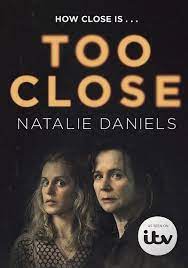
TOO CLOSE
UK, 2021, 3X 45 minute, Colour.
Emily Watson, Denise Gough, Thalissa Teiseira, Karl Johnson, Jamie Sives, Risteard Cooper.
Directed by Susan Tully.
Too Close is a three-part BBC miniseries. It is basically an interaction between two women and the consequences for each of them.
Emily Watson plays Emma, a psychiatrist, middle-aged, having experienced the accidental death of a difficult child, tentative in her marriage, some suspicions about her husband. She is often depressed, drinks.
Denise Gough is Connie, a mother of two who is seen at the beginning of the film driving, two children in the back of the car, and plunging into a river. She and the children are rescued. However, she is in police care and because of her mental condition is required to have sessions with the psychiatrist.
At first, Connie is sardonic, asking Emma are very personal questions which have an effect on Emma in her own life. Connie responds to questions, and the past is seen in dramatised flashbacks. And, it is the opportunity to see Connie as her real self rather than the injured and battered woman in police custody.
One of the key elements that Emma works on is medication and its effect – and, especially, withdrawing from medication without proper supervision and the possibly psychotic consequences.
Connie is able to be healed and reunited with her children. Emma also has some healing because of her championing Connie’s cause, even in court – and discovering that her suspicions about her husband were completely misplaced.
A small miniseries compared with other spectacles but an important portrait of women’s interactions and issues of mental health and medication.
- The dramatic impact of a three-part series?
- The setting, the English city, suburbs, homes, the roads, bridges, the river? Prison, psychiatrists, offices? Playgrounds? Family sequences? The musical score?
- The title, as applied to Emma? Connie?
- A film of interaction between two women? The establishing of Emma’s character, gradual revelations, her age, her drinking, moments of depression, her professional skills? Tense relationship with her husband, his loving response? The later revelation of her suspicions about an affair, and his explanation of what it happened, her relief, her misjudging him? The gradual revelation about their daughter, the difficult birth, sleeping from the one-hour, growing up, the tantrums, the tantrum in the stroller, Emma’s reaction, on the phone, the stroller being hit by the truck? Her grief and the consequences? Her husband unable to mention her name?
- Establishing the character of Connie, in the car, the children in the back, the roadworks, backing, her driving into the river? The reputation repetition of this sequence throughout the film? Her surviving, her injuries, battered look? In custody? Required to have the sessions with Emma? Her sardonic remarks, the touch of cynicism? The criticisms of Emma, challenging personal questions? Gradually revealing her story, the flashbacks, seeing Connie as her real self, her relationship with her husband, the friendship with Ness, her friend in relationships, daughter? The friendship between the children? Connie at home, her son? Involved in social activities? Exuberant? The effect on the sessions, telling her story, wanting to continue with Emma?
- The effect of her work on Emma, taking it home, drinking, her husband and the visitors, her disgust at their treating Connie simply as a case, curiosity? Her emotional reactions, denunciations? The contrast with her socialising, the energetic dancing?
- Connie, the fire, everybody out, her making her escape, climbing the tree, Emma called, persuading her to come down? Continuing their work?
- Emma, the issue of medication, going to the centre of the school, the interrogation of the woman in charge?
- The focus on the issue of medication, controlled, supervised, ways of coming out of medication, Connie treated wrongly, psychic states, protecting the children? And the revelation of her husband, seemingly good Catholic, Emma’s visit, taking him to the hospital see his daughter? The husband and his having an affair with Ness? The consequences for Connie, the repetition of the accident?
- The hearing, Emma giving testimony? Connie, coming back to good health, the visit to her daughter, the reconciliation with her son?
- The future life for Connie? Emma and the effect of the case, the bond with Connie, and bonding again with her husband?
Vivo
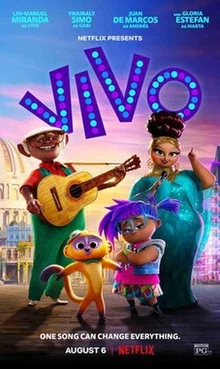
VIVO
US, 2021, 95 minutes, Colour.
Voices of: Lin-Manuel Miranda, Ynairaly Simo, Zoe Saldana, Juan de Marcos Gonzalez, Brian Tyree Henry, Gloria Estefan, Michael Rooker.
Directed by Kirk DiMicco, Brendan Jeffords.
Looking for something colourful and bright, Latin American music, rhythms and beats? Looking for a animation film that might intrigue the children and gives an entertainment for adults? Perhaps Vivo is the answer.
It is definitely very colourful. The setting is Cuba, the city of Havana, details of the city, especially the public squares where an old man, Andres, sings and plays, people gathering to listen, and he opens his trolley and what happens?… Vivo emerges.
The important credit for the film is that the songs were written by Lin-Manuel Miranda who sings all of Vivo’s songs. Lin-Manuel Miranda has made quite a name for himself over the last 15 years, the staging of his New York musical, In the Heights, released as a film in 2021, but, most famous, for the stage success of his American history musical, Hamilton, and its being filmed for television and streaming release. Miranda is a recitative style in the lyrics is certainly to the fore here, lively, rhythmic, a strong beat.
Vivo is certainly a cartoon character. The notes explained that he is a kinkajou - which will baffle most of us until we hear that this is the name for a one-of-a-kind forest honey bear. He is small, obviously cuddly if he slowed down, but he sings, dances, enchants the people (who put money in the hat as it is passed around).
Amongst those who watch is Rosa and her daughter, Rose, who will later form a partnership with Vivo in song and performance.
There is a serious plotline as well. Andrew is used to perform with Marta, long ago, but she departed for Florida and they have been long separated. News comes with Marta in Florida and the hope that Andrews might go there and sing with her. That is not to be and so vivo become something of an ambassador for under is, with a letter that he wrote way back when.
Marta (voiced by Gloria Estefan) is older, has been successful, is a noted singer. Vivo goes on his mission to Florida. But, since this is a happy, lively show, there is a happy ending.
- Popular animated musical entertainment – for younger audiences, older audiences?
- The work of Lin- Manuel Miranda, songs, lyrics, lively, Latin American tones?
- The Cuban settings, the city of Havana, the neighbourhoods, the public spaces? The comparisons with Florida, the cities, music, performance?
- The range of songs, the lyrics, the rhythms, the beats? Revealing characters? Revealing situations? Emotional content and impact?
- The visual style of the animation, colourful, humans, animals, situation? The voice talent?
- The title, Vivo, as a kinkajou, a forest honey bear, one-of-a-kind? Appearance, size, voice, dancing talent, singing talent? The friendship with Andres, the buildup to the revelation, Vivo in the cage, emerging, singing and dancing, And Rosa playing, verve, collecting the money, people’s response? The range of characters in the city, the response to the music?
- Rosa, her little daughter, appearance, response to the music, friendship with Vivo?
- Andres, his story, his love for Marta, the news from Florida, his memories of the past, the flashbacks, her singing, their being young, dancing together, his being dashing? The memories of her leaving, her invitation to him, his being unable to go? The years of regrets?
- Vivo, the message for Marta, going to Florida, encountering her, her age, her singing, popularity, the news about and Rose?
- Vivo and his return, his teaming with Gabi, their singing and dancing, the exhilaration, the crowds?
- Marta, her return to Florida, joining in the exhilaration?
Believe

BELIEVE
UK, 2013, 99 minutes, Colour.
Jack Smith, Brian Cox, Natascha McElhone, Anne Reid, Philip Jackson, Kate Ashfield, Toby Stephens.
Directed by David Scheinman.
British audiences enjoy football films. And, Manchester United, was one of the key clubs in competition.
This is a story of Sir Matt Busby, Scots player, coach of Manchester United after the war till the end of the 1960s. He was haunted by an accident in 1958, plane crash, the death of so many of the players. However, he was encouraged to continue coaching, supported by his wife. Matt Busby is played here by the ever-reliable Brian Cox with Anne Reid as his wife.
At the centre of the film is a young boy, George, played by Jack Smith, very convincing as a tearaway, upset about his father’s death, making life difficult for his mother (Natascha McElhone), talented with the football, his mother wanting him to go to a prestigious Lancashire College, his having to have private tuition, unwillingly, but finally sitting for the exam.
But, the important thing is his stealing a wallet, from Matt Busby, wanting money to enrol his friends as a team in the football competition. Caught, he then breaks into the tutor’s house but again is caught. Busby’s attention is drawn to George’s talent with the ball and decides to coach the team, enlisting his old friend, Bob (Philip Jackson reminding enthusiasts of his ongoing role as Inspector Japp along with David Suchet as Poirot). Busby does not tell the children who he really is – and George later reacts upset, feeling that Busby had lied to him.
There are enjoyable coaching sequences, the response of the young children, the littlest in the group as well as the girl who has quite some talent.
Of course, this will all build to a climax with the final match, George boycotting and doing his exams, his relenting mother going to get him, his coming on at the second half, scoring the final goals (and Matt Busby seeing the vision of his admired dead footballers encouraging).
Entertaining and a morale booster for young audiences.
- A popular football film? British audiences? International? Manchester United?
- 1984, atmosphere, the suburbs, homes, streets, poverty? The contrast with the Lancashire school and its prestige, grounds, interiors? Sitting for exams? The football fields, the boys playing? Musical score?
- The title, Matt Busby and his career, coaching Manchester United, quarter of a century, the experience of the plane crash and tragedy, loss of faith, having to believe again, his encounter with George, seeing his talent, the decision to coach, enlisting the help of Bob, the hostility of George’s mother, the agreements, the training, the boys and girls and the team? The competition and participating?
- George’s story, his age, the death of his father, his mother’s severity, her wanting him to get the scholarship, the visit to the College, the meeting with Dr Farquar, the agreement about the tuition, preparation for the exam? George unwilling? The stealing of the wallet, the encounter with Matt Busby, his ability with the ball, his response to Matt and the discussions about coaching, wanting his group to enter the competition, breaking into Dr Farquar’s office, taking the money? His being caught, the police, his mother, Matt getting him out? Paying the entry fee? The play, the coaching, the range of members of the team, friendship, the smallest member, having a girl, her skills and talent?
- Erica, bringing up George, his being difficult, wanting him to get the scholarship, the visit to the College, the tuition, forbidding him football? Her being upset with Matt Busby? Their arguments? Arguments with her son? With her friend Helen? Her finally relenting, George asking her to go to the match and support the team, her going to get him from the exam, the breakdown, eventually arriving?
- Dr Farquar, his band and his musical ambitions, seeing him alone in his office, his bringing the band onto the football field, and the delaying tactics until George arrived?
- Matt Busby, his age, experience, background, his being haunted by the plane crash, the presence of the dead players and his admiration for them? Not telling George and the children the truth? Bob’s arrival, his friendship with Bob, Bob and his personality? The coaching? The response of the children? George and his talent? Matt and his relationship with his wife, her encouragement?
- George, upset about the truth, feeling that Matt had lied to him? His reaction, doing the studies, decision to sit the exam? Doing the exam, his mother coming to get him, returning to the match, late, going on the field, the goal? (And the image of the dead footballers appearing in supporting?)
- A popular football film? An encouragement of youngsters, with difficult backgrounds, playing, sense of achievement? Belief?
Pefect Candidate, The
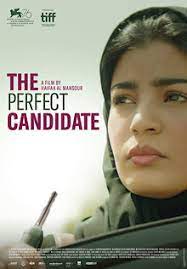
THE PERFECT CANDIDATE
Saudi Arabia/Germany, 2019, 104 minutes, Colour.
Mila Al Zahrani,. Khalid Abdulraheem, Tareq Al Khaldi.
Directed by Haifaa Al-Mansour.
Nominated for Oscar for Best Foreign Language film by Saudi Arabia.
The director is the first woman director from Saudi Arabia, educated at the American School in Cairo and then at the University of Sydney, making an impact with short films and than a documentary, Women without Shadows. She made the significant feature film in Saudi Arabia, Wadjda, 2012. She has also worked in the United States on television series and the film, Mary Shelley, with Elle Fanning.
This film was produced with German finance. In its story of a woman doctor who decides to stand for the local Council, a woman breaking ground in terms of politics and campaigning, it reflects something of the career of the director, and her breakthrough film career for Saudi Arabian women. (And, a reminder of changes in legislation in the Kingdom, she is seen driving her car.)
The film was written by the director and her husband, Brad Niemann. Set on the outskirts of Riyadh where it was filmed, the setting is a local hospital where the central character has a reputation as doctor and surgeon. A key scene involves an old man refusing to let her touch him or examine him, illustrating the innate prejudice about a woman’s place (echoes of other sequences, especially when the doctor goes campaigning for the election).
The film shows the family life, the father an eminent member of a band, touring with his band, performing at weddings, winning a national competition and government grant. While the doctor has ambitions for further work and tries to travel to Dubai, she falls foul of regulations. In the meantime, the road to the hospital needs work and so she decides to stand for election, the repair of the road being her platform. She follows techniques for campaigning, makes a video, wants to address a group of men but has to do it by video, angry with them and then appearing in public. She wants her father support but he is on tour.
She is also helped by the grandson of the angry old man who was persuaded his grandfather to let the doctor perform surgery which is successful. At the end of the film, after she has lost the election, he pays tribute to her.
To that extent, the film ends hopefully even if success takes a long time.
- The title, a female candidate for elections for local councils in the Kingdom?
- German and Saudi production? Local locations, Riyadh, the outskirts, the local hospital, roads, homes, tense for campaigning, wedding celebrations? The musical score, songs?
- The work of the director, her career as a female director in Saudi Arabia? Some of the plot lines resembling her struggle for recognition?
- The situation, Maryam, the status of women in the Kingdom, her dress, veiled, at the hospital? Reputation? Fellow workers and doctors? The interview with Omar and his grandfather, the grandfather’s hostility towards her, towards women? Omar persuading him to have the surgery? Her ambitions, wanting to travel to the International conference, bureaucracy difficulties, the office for applications for standing for office? Her decision?
- At home, memories of her mother, her father and his music, his band, on tour, wedding singers? Her sisters? Her decision, their support, difficulties? The response to Omar helping her? Her wanting her father to help with the campaign?
- The campaign, getting hints from the Internet for campaigns, making the video, speeches, Omar arranging the tent, the men coming to listen, not able to address them directly, by video, the reaction and questions, her coming out and addressing them directly, forcefully? This being filmed, people watching it online?
- Strong convictions, the election day, the results, the men and their comments?
- Her father, the performance, winning the government grant, the return, supporting his daughter?
- Maryam, the visit from the old man and his thanks? A further step towards women and their place in government?
Persian Lessons
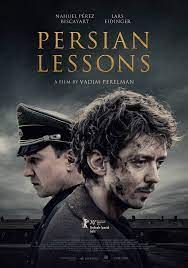
PERSIAN LESSONS
Russia/Germany/Belarus, 2020, 126 minutes, Colour.
Nahuel Peres Biscayart, Lars Eidinger.
Directed by Vadim Perelman.
Persian Lessons is an unusual or unexpected title for a film about Nazis, Jews, concentration camps during World War II. It states that it is based on a true story.
While the story is intriguing in itself, the film is very strong on showing the callousness of the ordinary German soldiers, men and women, doing their duty with loyalty to Hitler, killing without any strong sense of destroying another human being, going off to be entertained as they dominate the prisoners.
Argentinian actor, Nahuel Peres Biscayart, plays Gilles, son of a rabbi, imprisoned in Belgium, allegedly to be transported but actually to be shot. In the back of the truck, he encounters another prisoner who is starving who begs him for his sandwich. He does give it and receives in return a book in Farsi that the other prisoner had picked up after a Persian family had been taken.
Gilles is shrewd and is able to survive for some time in the camp, producing the book, claiming that it was his, and that he had Persian ancestry. As happens, one of the officers commanding (a mixture of the cruel and the foolish), Koch (Lars Eidinger), remembers his brother who refused joining the Nazi party and went to open a restaurant in Teheran. He now wants to learn Farsi in order to be ready to go to Teheran after the war. Gilles offers a wonderful opportunity for him to learn the language.
On the one hand, there is a lot of farce as Gilles, sometimes with difficulty, especially in remembering the language and words he is creating, agrees to teach Koch Farsi, a few words at a time, then many words. Koch has sacked the female officer who was copying the names of prisoners into the register and Gilles gets the job, working part-time in the kitchen as well, living in the barracks.
This means that the audience sees the range of life in the concentration camp from the point of view of the officials, from the point of view of the workers, life in the barracks as well as in the quarries and the hardships of rock breaking.
Needless to say, there are some close moments at times but Gilles devises a clever way of inventing words by taking the first part of the surname of the prisoners and nominating a meaning!
With ups and downs, this continues for several years until the allies advance on the camp, Gilles finally taking on his Jewish identity and marching away with the condemned, Koch disguising himself and there are some very funny sequences, as might be anticipated, as he tries to talk to Allied officials with his years of learning Farsi vocabulary!
There must always be stories of World War II, of the Holocaust – this one is certainly arresting and rather different.
- The title? A true story? Nazi Germany, concentration camps? The exotic Persian and Farsi background?
- Another war story, Germans, Jews, Nazi behaviour, prisoners in camps? The issue of freedom? Variations on the well-known stories?
- 1942, France, the roundup, the prisoners and vehicles, getting out, leaving the luggage, being suddenly and brutally shot? The reaction of the Germans and their killing?
- The situation, Gillrd, in the train, the Jewish background, Rabbi father, having the sandwich, the prisoner’s appeal, Gilles giving it to him, getting the book in return, the dedication and his assuming that identity, abandoning the suitcases, the lineup for being shot, Gilles and his shrewdness, falling before the firing, his claiming to be Persian, the proving it,F speaking Farsi, Bayer and his reaction, reporting to Koch, the cans of meat as motivation, yet his suspicions?
- Gilles’ character, his age, experience, intelligence, able to conceal the truth about himself, creativity and lies, adopting the identity, going to the barracks, assigned to work in the kitchen?
- Koch, cruel, the executions, self-importance? His background as a chef? His joining the Party, his brother escaping, going to Teheran, his intentions of learning Farsi, after the war going to Teheran and setting up a restaurant? His dramatising the seeming callousness of the Nazis and the military, no remorse in killing?
- The camp, the military, the women, enters into the log? The Commandant and his attitude? Bayer and the other soldiers, relationships, sexuality, jealousies? Plans and counter plans? Intrigues – and being sent to the front in Russia?
- Koch, his desire to learn Farsi, his wariness, but believing Gilles, threats, getting him to work in the kitchen, but also copying the files?
- The title of the film, the Persian lessons, the words, genial and his inventing them, Koch writing down, the limited number, rehearsing, the increasing number, caution his demands, Gilles having to learn the language he was creating and to use it? The transition from cooking to copying the documents, so neatly? His brainwave in using the names of the log to invent falsehoods?
- Time passing, Koch learning, even writing a poem in the alleged Farsi, conversations? Bayer and his continued suspicions? The jealous former copyist? Giving Gilles the rubbish, an opportunity to escape? Gilles and the decision to return? The danger of the same word for bread and tree, his explanation? Sending him to the quarries and the harsh breaking of rocks? His collapse, hospital? Koch pardoning him? Koch and his explanation of the situations to the commander?
- The war continuing, the women and their plans, and his plans, the gossip about the commander on sexuality? Using it to protect himself?
- The approach of the Allies, the Germans burning all the documents?
- The food, the Italians in the camp, Gilles getting the food for them, Koch allowing it? The confrontation in the barracks, the Italian giving his life?
- Gilles and his escape plan, Koch and his plan, using the papers? Gilles and his putting on the Italian jacket, identifying as a Jew, Bayer telling Koch that he was leaving? Koch pursuing? Gilles continuing, his escape?
- The humour and irony of Koch explaining his Ffarsi, and the interpreters commenting on his gibberish?
- Gilles, with the Allies, the interrogations, his ability to recite from memory, with the association for words, the thousands of names and dates in the files?
- The different war story?
Safeguarding, a key to MSC pastoral care. Students for inservice at the Gregorian University, Rome.
Safeguarding, a key to MSC pastoral care. Students for inservice at the Gregorian University, Rome.
Tim Brennan MSC, Director Professional Standards, Via Asmara, sent this information.

Pope Francis in recent days addressed a special Child Protection gathering of the bishops of Eastern Europe. He challenged them to a greater engagement by their churches in the protection of minors and vulnerable adults.
I encourage you to listen to the cry of the victims and to dedicate yourselves, with each other and with society in a broader sense, in these important discussions because they truly touch the future of the Church in Central and Eastern Europe – not only the Church’s future, but the hearts of Christians as well. This is our responsibility.

You are not the first to have had the responsibility to undertake these steps, which are necessary, and it is probable that you will not be the last. But know that you are not alone in these difficult times.
The recognition of our errors and our failings can certainly make us feel vulnerable and fragile. But it can also present a moment of splendid grace, a moment of self-emptying, that opens new horizons of love and reciprocal service. If we recognize our mistakes, we have nothing to fear, because it will be the Lord himself who will have led us to that point.

Meeting with Juan Carlos Cruz, abuse victim from Chile
With malice toward none and charity toward all, I urge you to be humble instruments of the Lord, at the service of the victims of abuse, considering them as companions and protagonists of a common future, learning from each other and become more faithful and resilient so that, together, we might face the challenges of the future. May the Lord bless you, may the Madonna protect you, and please, do not forget to pray for me. Thank you.
It is encouraging to say such action already under way in one of our MSC Provinces.
The Indonesian Province recently moved in the direction the Pope called for with two members enrolled in the Safeguarding Diploma at the Gregorian University beginning in late September. The five-month course is in English each September, and in Spanish in February. Places in the course require a registration many months in advance. The two MSC are:
Yulius Sodah

I was born on July 11, 1979, in a very small ‘catholic’ village located in Central Sulawesi, Indonesia. My family is a mixed culture family. My father is from Maumere, Flores and my mother is from Minahasa, North Sulawesi. I was ordained on July 5th, 2008, in my village and it was such a blessing for me. After my ordination, I was assigned as a formator in the postulancy, assisting two other confreres. After four years, I was sent to study psychology and become qualified formator. I spent seven years to become a psychologist. From January 2020, I was assigned as a formator at MSC Indonesia Scholasticate till now. In September 2019, the MSC Indonesia Leaders Meeting assigned me to be the coordinator of MSC Protocol for safeguarding children. Now, I am in Rome to attend the diploma course on children protection, at the Gregorian University
Fransiskus Bram Tulusan

My full name is Fransiskus Bram Tulusan. Bram is my nick name. I am from Indonesia. I was born October 20, 1982 in Kotamobagu Manado Indonesia. I was ordained as a priest in Manado, June 29, 2011. I have been in formation ministry for 11 years: St Yudas Thadeus Minor seminary Langgur-Diocese of Moluccas (2009-2010), St Francis Xavier Minor Seminary Kakaskasen – Diocese of Manado (2011-2016), MSC Scholasticate Indonesia (2018-2020), MSC Postulancy Indonesia (2020 - now). Cor Vitae, Formation for formators – Philippines (2017). Since 2019, I have been appointed as the member of Protocol team of safeguarding for children and vulnerable adults for the MSC Indonesian Province. It is a new mission and challenging for me as well, for I have to deal with issues that are new, for me at least. To support this ministry, our province sent me to attend the diploma course of safeguarding for children in Rome. The course will be held this September 2021-February 2022.
Jungleland
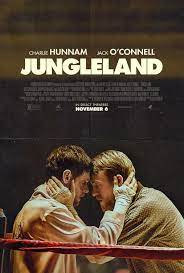
JUNGLELAND
US, 2019, 90 minutes, Colour.
Charlie Hunnam, Jack O' Connell, Jonathan Majors, Jessica Barden.
Directed by Max Winkler.
Jungle land is not exactly an enticing title. It is the name of a centre in San Francisco where tough audiences gather to witness tough fights. And, during the film, there certainly are some tough fights, culminating at Jungle Land.
But, as it turns out, this is a deeper film about the relationship between two brothers. The older, Stan (Charlie Hunnam) has the brains, has spent his life protecting his younger brother, with the brawn and tough fists, Walter (Jack O’Connell). (Interesting to note that the two central characters, very American, are played by British actors.)
Stan can be shrewd but he can also be a man of poor practical judgement. He gets tangled with criminals, makes bets on fights that Walter will win – but not always. Which means a lot of debt. The brothers squat in various places, ready to escape quickly. And, for a time, they work in the garment factory, Walter at a sewing machine, stand with all the bravado posting on the floor of the factory.
Then the film becomes a road film, stand pressurised by the criminal contact to go to jungle land for Walter to fight. But the condition is that they take a young girl, Sky, a wood-be dancer who is prone to cause trouble, to another gangster in Reno, who has bought Sky and wants to have a child with her.
There are quite a lot of episodes on the way, of course. At one stage, Sky spikes Walters a drink, gets in a tangle with toughs at a diner, and then she crashes their truck. Money difficulties. Getting the truck repaired. Entrepreneur Stan suggesting that Walter fight to of the garage attendance and, if he wins, the repairs done for free.
In the search for money, Sky suggests they visit her parents who turn out to be particularly religious and stern with Sky, ousting her.
Eventually, they get the bus to Reno and there is dangerous confrontation between the gangster and stand, and Water taking matters into his own hand as Sky disappears. Shootings and killings.
By this stage, the characters of the brothers have ingratiate themselves with us so that as we move to the final fight, Walter not realising the consequences of what has happened, stand ready to take responsibility, Sky turning up in the audience, there is some emotion in us as the final credits roll.
- Expectations from the title? The life of the two brothers crossing the United States, an American jungle? The finale, the boxing bout, Jungleland?
- The travel through the United States, from east to west, the range of cities, the small towns, the open road, the countryside? The brothers and scavenging accommodation, quick getaways? The sewing factory and their presence? The connection with the gangsters, the commission to take Sky? The motels, the diners, repair garages, the contrast with the meal at Sky’s home? Reno, the squalid set up with the gangsters? Cars, trucks, buses? San Francisco, the buildup to Jungleland, the fight? The musical score?
- Stan and Walter, the bond between them, Stan and his shrewdness, Walter being more simple, his boxing talent? Dependence on each other? Stan and his initiatives, money, betting on his brother? The gangster connections? Walter, his fight, distraction, expecting to win, knocked out? Their accommodation, Walter and his exercise, Stan and the supervision? Their working in the factory, Walter at the machine, Stan and his boasting to the supervisor?
- The contact with the gangster, the money issue, Stan owing the money, no repayment? The pressure to go to Jungleland and fight, the condition of taking Sky? Sky, her age, wanting to be a dancer, surly attitude, trouble, spiking Walter’s drink and the consequences, crashing the truck? Yet her conversations with each of the brothers?
- Financial difficulties, credit cards not working, the truck, trying to set up the fight, the managers not wanting it, the workers agreeing, the fight and Walter winning, two against one? Driving away? At the diner, the truck being towed, the money in the truck?
- Sky, her family, calling in for the meal, pretending that they were at a religious group, the religious attitudes of the parents, the fierce stance of the mother and ousting her daughter?
- The desperation, Walter and his training, taking the bus, arriving in Reno? Sky and her running away? Stan going to the agent gangster, the story about Sky being pregnant, his wanting her son? His henchman? Leering attitude?
- Walter, the bond with Sky, the sexual encounter, her leaving? Stan and his gun, Walter with the gun, overhearing the leering gangster? Walter shooting them dead?
- San Francisco, the fight, Walter being overwhelmed, Stan present, the police arriving, his being arrested for the killings and taking the blame, Sky in the background?
- Walter and sky? Future? The dream of the drycleaners? Stan and prison?
- Performance and portrait of the two brothers, love, working together, dependence, some recriminations, reconciliation?
House on Fire, A/ Ann Rule's House on Fire
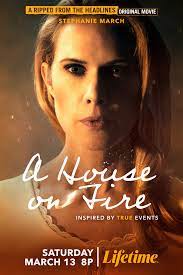
ANN RULE’S HOUSE ON FIRE
‘
Canada, 2021, 85 minutes, Colour.
Stephanie March, Shaun Benson, Connor Peterson, Isla Gorton, Amy Groening.
Directed by Shamim Sarif.
The original title of And Rules novel, based on actual events, is Bitter Harvest. House on Fire seems a far better title.
This is the story of a marriage where the partners had high hopes and dreams for their married life. She is Deb (Stephanie March), a high IQ successful Dr, rather disdainful of others, not a strong bedside manner, but charmed when a colleague suggests to another doctor, Mike (Shaun Benson) to invite Deb on a date. She agrees, succumbs, they marry.
However, the film is opened with a mansion on fire and Deb rushing out in grief and despair.
It is in that context that we go back 17 years to the courtship and marriage. And then we move almost 17 years on, to 6 months before the fire. Mike and Deb have a comfortable home, both of them work at the hospital, Mike in line for considerable promotion. And they have two teenage children, Tim and Kelly.
But, all is not well. The focus of the drama is on Deb, her becoming and developing as a mother, devoted to her children, not doing so well at work, not keeping up with the demands for further qualifications, arriving late… Even this leading to suspension. Mike, on the other hand, is busy, genial with his children, trying to support Deb. And they have had a dream of owning a mansion – and, eventually they do, whether they are comfortable.
We realise, of course, that all is not well with the marriage and, we further realise that Deb has some mental problems, certainly unwilling to face them, in denial. She says she continually wants to build the marriage but becomes jealous, Mike discussing matters with Celeste, a psychiatrist, and, rather inevitably, having an affair with her.
Interspersed with all this are interviews, separately, with the police questioning Deb and Mike, he innocent of setting the fire because he has been in hospital at the time after a collapse. Deb, both emotional and unemotional, declaring she would do anything for her children.
The ending is grim, especially as we realised we have watched a marriage unravelling in a highly qualified and intelligence Dr unravelling.
- Based on characters and events? Fictionalised? The drama, melodrama? Canadian production?
- Kansas City, hospitals and awards, corridors and offices? Homes, school, psychiatrists’ offices…? The new house, the mansion, grounds, interiors? The musical score?
- The title, the original novel, Bitter Harvest? The sequence of the fire, the mansion, enormous fire, Deb running out, her desperation?
- The film as a flashback, to 17 years earlier, Deb, doctor, very demanding, no bedside manner? Her colleagues? Keeping to herself? High IQ, sense of superiority? Mike, his interest in her, the colleague urging him to flirt? Her reaction, the date, the coffee, her enjoying it, the issue of the second date, the going out, courtship, the details of the wedding, the celebrant and their being impulsive? The life commitment? The hopes for a happy life? The two doctors?
- Moving to 6 months before the fire, at home, Tim, his age, school, Kelly, her age, violin and music? Mike and his success, being offered trips to Baltimore, promotion? Deb, continuing her work, not having the time to complete her qualifications, at home, her devotion to the children, domestic scenes, picking them up from school? Mike and his moving on his own career? Deb, being interviewed by the authorities, warned about not getting partnership?
- The portrayal of Deb, superior, her qualifications and career, success, as a mother? Tensions with Mike, her supporting him? The scene of the fall, her wrist, the treatment, medication?
- The picture of her gradual decline, tablets, opioids, dependence, moving to addiction, her drinking? Her sense of superiority yet her continually being subservient to Mike, wanting new beginnings?
- Mike, his own career, love for his children, the domestic scenes, relationship with Deb, fragility, the parents’ night, the encounter with Celeste, Deb and her suspicions, Mike and the discussions with Celeste, at the hospital, leading up to the affair?
- Deb and her response, discussing it with the children, wanting them to stay with her for separation, her manipulating them and their attitudes?
- Mike, the 10 year dream, the dream house, her checking it out, Mike and the possibilities, the agent, the discussion about decisions? Deb, collapse, Mike and the decision to buy the house, then moving in, communications between rooms, spacious, luxury?
- Mike, Kelly’s recital? Deb, more erratic, told of her suspension? Her resentment? The opioids, the drinking? Her collapse?
- Deb going to the office, Mike with Celeste, the buildup to the confrontation? Deb poisoning Michael, Mike, his being in hospital?
- The experience of the fire and the old house, the effect on each of them? Deb, keeping the scrapbooks and photos over the years, starting to destroy the photo is?
- The night of the fire, audience suspicions?
- The interview sequences? Deb and the way she presented, and from the questions? Mike, the detectives probing the private life, his being in the hospital at the time of the fire, arriving?
- The terrible pathos of the two children being killed? Deb and her denials – and the final voice-over, her responsibility, serving sentences in prison, giving her life for her children?
- A frightening picture of a marriage collapsing, characters, family, mental situations, blame, tragedy and destruction?
Unknown Saint, The/ Le Miracle du Saint Inconnu
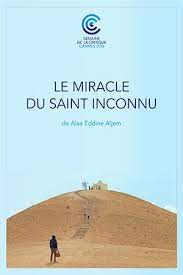
THE UNKNOWN SAINT/ LE MIRACLE DU SAINT INCONNU
Morocco, 2019, 100 minutes, Colour.
Younes Bouab, Salah Ben Saleh, Bouchaib Semmak, MahommedNouaimane, Anas el Baz, Hasan, Bdidah, Adelghani Kitab, Ahem Yarziz.
Directed by Alaa Eddine Aljem.
While the English title focuses on the unknown St and the shrine, the original French/Moroccan title focuses on the miracles that occur at the shrine and in the lives of the people in this desert village.
The camera takes full advantage of the desert landscapes of Morocco. It also immerses the audience in the remote village, streets, old buildings, interiors, the barbershop, and the shrine at the top of the hill.
The central focus of the screenplay is a thief, stranded in the middle of the desert, bearing the stolen money at the top of the hill. It is an arrest, jail, emerging after several years, returning and finding that a shrine has been built on the top of the hill and village has developed. He makes various attempts to recover the money, especially with the aid of an accomplice who is a strange mixture of stupidity, willingness to do violence, escaping when all seems lost.
The other characters in the village include the new doctor, bored with the lack of patience with any real illnesses, his long-time assistant, bored, who steals the clerk from the shrine. There is also the local barber who has a talent for making false teeth out of gold. Then there is a guard of the shrine, no duty, very severe on his son, but devoted to his dog. And there is the old farmer out in the desert who continues to dig the land despite no rain for 10 years, relying on his son.
There are some twists at the end of the film, especially the sun blowing up the shrine, discovering the money, building a shrine on the grave of his father.
Morocco’s submission for Oscar consideration in 2021.
- Moroccan submission for the Oscars? A film for Arab communities? Worldwide appeal?
- The title, the emphasis on the saint, miracles, shrines, pilgrimages? Issues of religious faith and prayer, expectations of miracles? Implications of superstitious belief?
- The desert settings, the vastness of the desert, the hill, the shrine, the village built up, the streets and buildings, the dispensary, the barbershop, the hotel, rooms? The drought fields, the hearts out in the countryside? The musical score?
- The dramatic aspects? The comic and ironic aspects? Portrait of the community, of individuals? The interlinking of the characters?
- The story of the thief, out in the desert, the hill, burying his bag, like a grave? The police, his imprisonment? Years passing, getting out? Returning to the village, shocked to find the shrine, the extended village? Staying at the hotel, the kindly man thinking he was a scientist? Phoning his collaborator? Mingling in the town? Going to the shrine? The guard and his dog? The attempts to recover the money, failure, his associate, suggestions for murder, running over the dog, having bad feelings, the return to the shrine, the three night pilgrimage? The final attempt? Hassan and the explosives, the blowing up of the shrine? The associate fleeing? The thief left wondering the desert?
- The guard, the dog, his harsh treatment of his son, profiting by the shrine, his successor during the day with the stall and drinks? His son and the animals, the accident with the dog? Taking him to the doctor, the issue of the teeth, the barber and his making gold teeth, stray dogs and models? The surgery on the dog’s mouth, success? And the doctor accepted into the community?
- The doctor, replacement, the nurse at the dispensary, longtime presence, the women and their perpetual illnesses, the same tablets? The men going to the shrine for miracles? The doctor and his being bored, discussions with the nurse, the drinking? The nurse, bored, stealing the plaque from the shrine? The decision to have their own miracle, the plaque, surrounded with straw, the symbolic design, the fire? The response of the people?
- Brahim, the old man, the drought, pride in his land, his reaction against the shrine, later going and attacking it? The pressure on his son, his son and the meals, the hard work? The neighbour, friendly, going to the village with his wife and daughter? The possibility of rain? The son, find his father dead, the ritual of the funeral? The rain? Taking the explosives, the scenes of the workers expanding the road? Going to the shrine, blowing it up? Finding the money, using the money to build his own shrine to his father? The pilgrims? The tourist taking photos?
- The barber, the clients, special creams, gossip, the men waiting? The making of the gold teeth?
- The range of pilgrims, the Fountain to put the money, prayer, pilgrimages?
- An entertaining blend of the dramatic and the comic, the Moroccan flavour?
Doing Hard Time
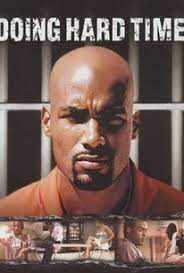
DOING HARD TIME
US, 2004, 95 minutes, Colour.
Boris Kodjoe, Michael Kenneth Williams, Sticky Fingaz, Regan Gomez-Preston, William L.Johnson, Steven Bauer, Giancarlo Esposito.
Directed by Preston Whitmore II.
As might be expected from the title, this is a tough film. It opens with a drug deal going wrong, dealer and client shooting at each other, the dealer accidentally shooting a young boy at the side of the road. His father is consumed with grief, upset that the trial does not indicate the guilt of either man, though both are sentenced to prison terms.
The screenplay stretches credibility in the sense that the father, with his grief, decides to commit a crime, actually bashing a policeman and reducing him to life in a wheelchair, so that he will be arrested, sentenced and sent to that prison where he can avenge the death of his son. The father is played by German actor, Boris Kodjoe.
Michael Kenneth Williams plays the shooter and the film focuses on his coping with prison, bribing a corrupt guard, having visits from two girlfriends, dealing with the father and his desire for revenge. There are severe guards. There is the prisoner who lorded over the others. There are some sympathetic prisoners.
The screenplay does not quite enfold as might have been expected, especially concerning the father and his fight with the shooter, and his death.
A grim entertainment.
- The title? A prison film? The setting of the prison, the range of prisoners, black and white, the guards, harshness, regulations and routines, fights, corruption?
- California, the city, drug deals, violence, the shooting of the boy? Police precincts? The street, the speeding car, bashing the policeman? His being wheelchair-bound?
- The credibility of the situation, the father, his grief, the death of his son? The court case, the two accused, lenient sentences? Neither men specifically blamed? The reaction of the father, his decision, to go into the prison, to get revenge, the car speeding, his bashing the policeman? In court, the sentence, prison?
- Michael Mitchell, age, experience, education, single-minded motivation? The routines of entering prison, the cell, sharing the cell? Making the links? The powerbrokers in the prison?
- Eddie Mathematic, status, playing cards, domination, the relationship with Craig? Michael Mitchell? The authorities? The deals with the guard?
- Curtis Craig, drugs, the pursuit by the younger man after the deal, the chase and shoot out, killing the boy? In court? His status in prison, with Mathematic, the interactions with Michael Mitchell? The visits from his girlfriend, the daughter? His white girlfriend? His violence, killing in the prison? Money and the guard?
- The guards, the corrupt guard, money deals, Curtis Craig and his girlfriend, the investment? Going wrong?
- The friendly prison with Michael Mitchell, his appeal, giving the money to Mathematic? His support of Michael Mitchell?
- The buildup to a confrontation, the use of the many shower sequences as a location, the weapon, the fight, Michael Mitchell being stabbed, Craig Curtis and his surviving?
- The years passing, Craig Curtis going to visit Michael Mitchell’s grave? His girlfriend and his daughter picking him up? His going scot-free – yet his being the killer of the boy, murders in prison…?
- Audience identification with the characters – or not? The situation?
